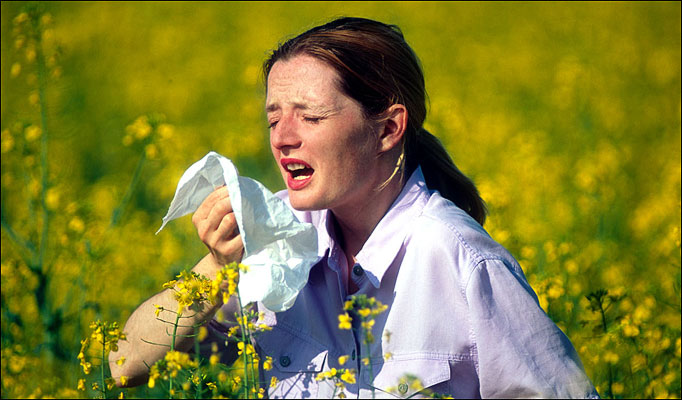Allergic rhinitis, also known as hay fever, affects 10 to 30 percent of children and adults in the US. Allergic rhinitis refers to inflammation of the nasal passages caused by allergens, notably pollens. Symptoms typically include itching, sneezing, runny nose, post nasal drip, nasal congestion, and can lead to inflammation or infection of the sinuses, known as sinusitis. Allergen-based inflammation may also occur in the lungs causing asthma with typical symptoms of wheezing, shortness of breath, coughing, and/or chest tightness—remember, it’s all one airway from the nose and sinuses to the lungs. Allergens can affect the eyes as well causing allergic conjunctivitis with symptoms of itchy, red, watery eyes. Most seasonal allergies are caused by pollens typically from trees in the Spring, grasses in the Summer, and weeds in the Fall. Year-round or perennial allergies are typically caused by dust mites, cockroach, animal dander, and molds.
Primary treatment of allergic rhinitis is prevention by environmental control measures geared toward reducing exposure to allergens. Some measures may include: staying indoors during high pollen days; keeping windows in your car and home closed; showering after being outdoors; and wearing a mask when gardening or mowing the lawn. Nasal saline irrigations can help rinse out allergens from the nasal passages. Care should be taken to use distilled or sterile water to prevent introduction of harmful infectious agents.
Antihistamines help treat the itching, sneezing, runny nose, and post nasal drip symptoms. Some antihistamines can potentially cause drowsiness effects and care should be taken accordingly. Oral decongestants, like pseudoephedrine, should not be used routinely as they may elevate blood pressure and are not appropriate for people with hypertension or other cardiovascular conditions. Decongestant nasal sprays such as Afrin should not be used for more than a couple of days as prolonged use may actually worsen symptoms. Prescription nasal steroid sprays can also be used to treat symptoms but proper technique should be reviewed with the patient by the prescribing physician to avoid adverse effects such as nasal bleeding. Additional medication treatments and potential desensitization measures such as Immunotherapy (allergy shots) are available for patients with persistent or refractory symptoms. Immunotherapy can help induce tolerance, decrease medication burden, reduce sinusitis, and better control, possibly even prevent asthma, thereby improving overall quality of life; benefits may last for years even after treatment is stopped. Talk with your doctor regarding the benefits and side-effects of the different treatment options and consider seeing an allergist. Choosing the right treatment may depend on the severity of your symptoms and other health conditions.
 By Parag N. Patel, MD, husband, father, and pediatric and adult specialist in allergy, asthma, and immunology at Allergy Partners of Richmond.
By Parag N. Patel, MD, husband, father, and pediatric and adult specialist in allergy, asthma, and immunology at Allergy Partners of Richmond.







